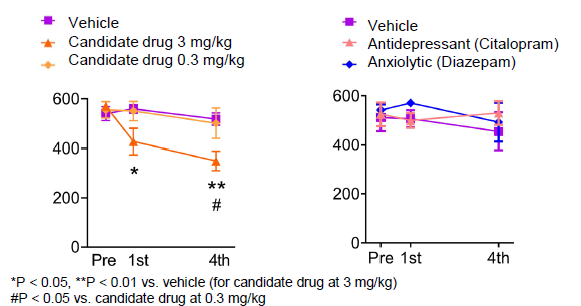Available Technologies
Novel Therapeutics for Obsessive-Compulsive Disorder and Process Addictions
Therapeutic candidates showing strong efficacy and rapid onset in treating treatment-resistant psychiatric disorders, such as OCD and process addictions
Background
OCD and process addictions are characterized by repetitive behaviors that are difficult for patients to voluntarily control, significantly impairing daily functioning.
Common pharmacological treatments for OCD include high-dose, long-term administration of antidepressants such as selective serotonin reuptake inhibitors (SSRIs). However, over half of patients are classified as treatment-resistant, showing little or no response to antidepressants.
Moreover, process addictions - such as gaming disorder and internet addiction - are newly recognized behavioral conditions, and currently, no approved pharmacological treatments are available.
Description and Advantages
Leveraging proprietary analyses of large-scale medical datasets, researchers at Kyoto University developed a drug-induced mouse model of OCD that is unresponsive to SSRIs, effectively mimicking treatment-resistant OCD. In-depth analysis of the model revealed an imbalance between D1-and D2-receptor-positive neurons in the striatum leading to the identification of a key target gene and a promising therapeutic candidate capable of restoring this balance (Fig. 1).
⮚Offers hope for majority of OCD patients resistant to SSRIs
⮚Shared neural mechanisms in OCD and process addictions suggest newtherapeutic potential

Figure1.EffectofthecandidatedrugonRepetitiveBehaviorinanOCDMouseModel
Toevaluatethedrug'sefficacyinreducingrepetitivebehaviors,arodentmodelofcompulsivebehavior-specifically,therepeatedgnawingofbeddingmaterial-wasusedasanindexofOCD-likesymptoms.OCDmodelmicewereintraperitoneallyadministeredeitherthenewdrugcandidate,anexistingantidepressant(citalopram),ananxiolytic(diazepam),orvehiclecontroloncedaily.Stereotypicbehaviorwasobservedfor10minutesondays1and4oftreatment.Administrationofthenewdrugcandidateat3mg/kgsignificantlysuppressedstereotypicbehavior(left),whereasneithertheexistingantidepressantnortheanxiolyticshowedsignificanteffects(right).
| Development Status |
•Validated efficacy of candidate drug in OCD model mice •Ongoing evaluation for potential indication expansion |
|---|---|
| Offer | •Patent License •Collaborative Research |
| Related Links | View PDFView in Japanese |
Have you found what you were looking for?
- Interested in a particular research activity
- Cannot find the information
- Have questions on how to utilize research results
Feel free to contact us and get answers to your questions.
Inquiry- TLO-KYOTO
- Available Technologies
- Novel Therapeutics for Obsessive-Compulsive Disorder and Process Addictions
3rd Floor, International Science
Innovation Building, Kyoto University
Yoshidahonmachi, Sakyo-ku, Kyoto
606-8501 JAPAN


